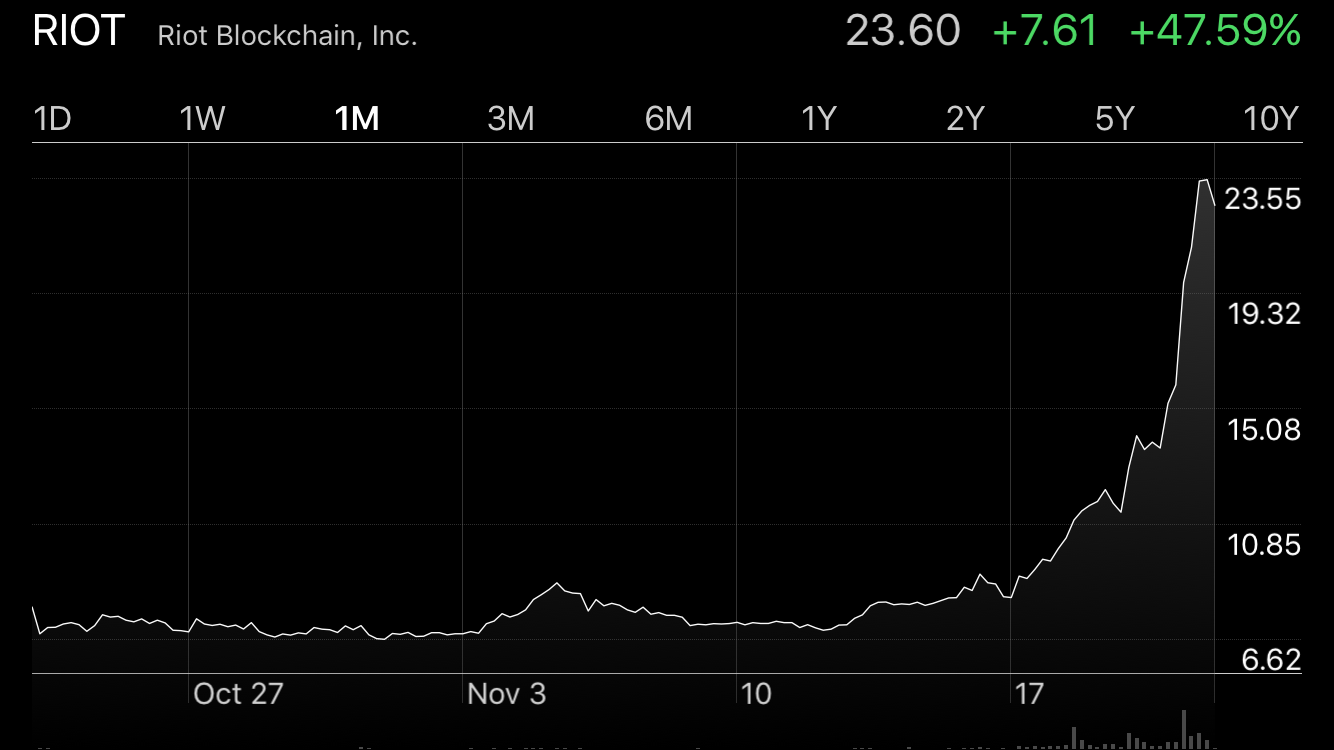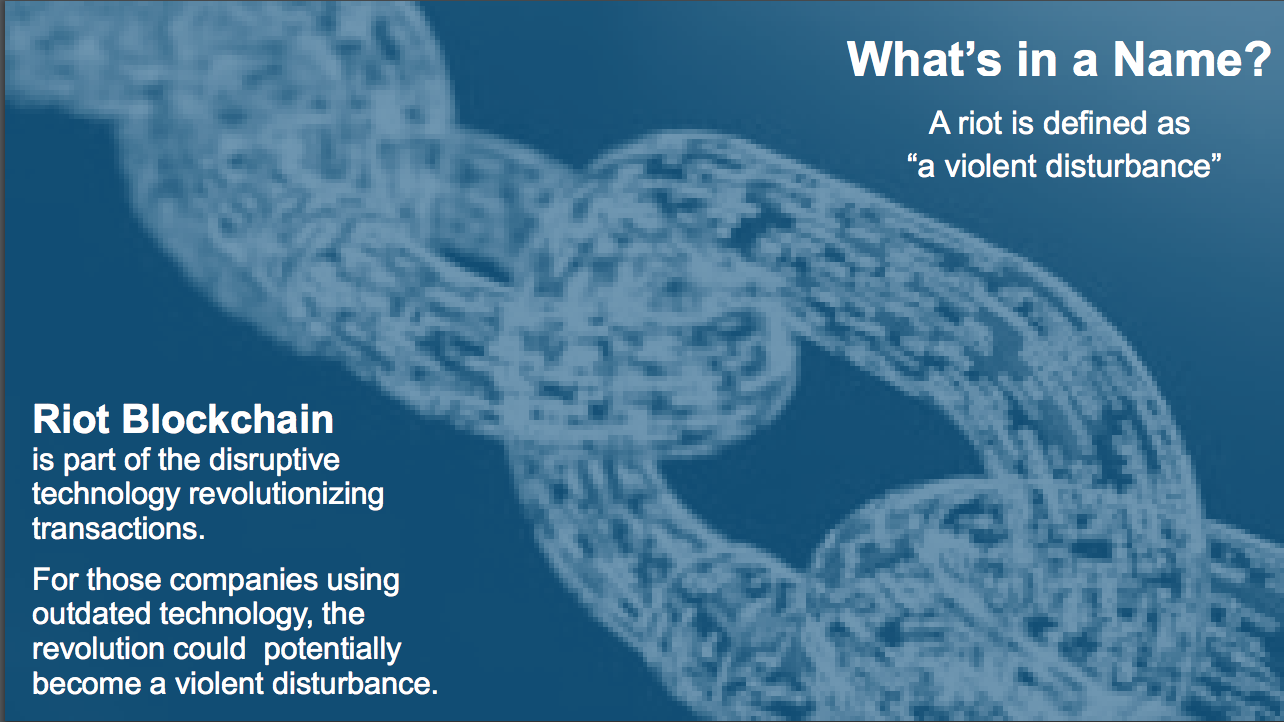What’s in a blockchain?
Last Friday, a stock called Riot Blockchain gained nearly 50%.
The former biotech company pivoted in October to “Blockchain.” Since then, the share price has risen from $5 to over $20.

Upon learning this, I went to Riot’s website to see what exactly they are doing with blockchain technology. I suggest you check out their site. I mean, this place has everything: a bitcoin and ether price feed, an animation of a gold coin bearing the Ethereum logo, and a proclamation that they are disrupting the future of transactions.
The first line of their About section betrays what is, of course, really happening here: “Riot Blockchain Inc is a first mover on the NASDAQ focused on blockchain technology.”
Their main value prop is that they are a publicly traded company that has said the word blockchain. Wall Street players have to date largely been unable to invest directly in crypto. Hungry for the action, they seem to be piling into this stock as a vehicle for some of that coveted blockchain exposure.
It’s right there on the third slide of their recent investor presentation: “What’s in a name?”

The importance of names in publicly traded stocks is well documented. Psychologists Adam Alter and Danny Oppenheimer studied this phenomenon in newly IPOed stocks from 1990 to 2004. They found that stocks with easy-to-pronounce names fared significantly better in early days of trading than others. If you can boost your stock price just by having a catchy ticker symbol, imagine what adding the word “blockchain” can do for you in 2017.
To be fair, Riot has put some money where its mouth is. It has acquired stakes in a handful of blockchain-oriented startups and has also entered an agreement to purchase mining hardware. This hodgepodge of “strategic” investments strikes me as a strange approach for a public company executing a pivot. It looks more like a haphazard attempt to quickly gain exposure to this whole blockchain thing. Of course, they could have just bought some bitcoin.
The company has said in its recent press releases that it “leverages its expertise and network to build and support blockchain technology companies.”
Expertise and network, eh?
Who are these people? I read their 2016 annual report so you don’t have to. That’s where this whole thing gets really weird.
The report does not even attempt to construct a coherent narrative for the meandering course that the business has charted in the years since it was founded in 2000.
The company began its life as a veterinary venture. In 2004, it acquired an exclusive license agreement for products related to cattle reproductive health and animal pregnancy testing. It has since sublicensed this IP to a French animal health company.
Around 2012, the company changed course into diagnostics. It spent several years attempting to obtain approvals from the FDA for a blood test that would be used to rule out the possibility of appendicitis in (human) patients. It failed.
In September 2016, just 14 months ago, the company made another acquisition: this time the target was a company that was building something called Enhanced Surface Plasmon Resonance technology. I don’t know what this product is, but I can tell you that working on it for a little over a year is unlikely to endow you with expertise in blockchain technology.
One theme that has been consistent for the company over the years is management’s inability to deliver results. No matter the market, industry, or product, the company’s financials have been perennially abysmal. As of December 31, 2016, the company had an accumulated deficit of almost $110 million. They achieved $9,000 in sales last year. There is no “k” missing from the end of that number. Nine thousand dollars. You don’t need to know accounting to know that this is not good.
I have to admire management’s honesty about all their misguided decisions, though. In their 2016 annual report, one of the first things they said regarding their biotech strategy was: “It will be difficult for us to establish a market position… We believe that most of our competitors have significantly greater financial, manufacturing, marketing and product development resources than we do.” Pretty self-reflective for a venture that has taken so many wrong turns. It’s unclear, however, why they think their market position “in blockchain” is any better.
There’s something about saying the word blockchain that is currently causing normally thoughtful, intelligent people to lose their heads.
FOMO is a big part of this, but it’s not the only dynamic at play. There is also a Fear Of Missing Something. What I am talking about is a form of gaslighting that has gripped the market. People right now will hear about a token or a company or a pivot and they might think to themselves, “this whole pitch doesn’t make a lot of sense to me.” But then they look at the price of bitcoin, read some jargon-filled whitepapers, and shrug and go, “well I must just be missing something here.”
To these people I say: you are not missing something. You don’t need to understand blockchain technology to be able to spot bad business models or poor management teams. Keep your wits about you in this market.
After all, would this company by any other name look like quite so cheap?
Thanks to my mom for first pointing out to me the crazy rally in this stock. And then for listening to me complain about it for the better part of Thanksgiving weekend.